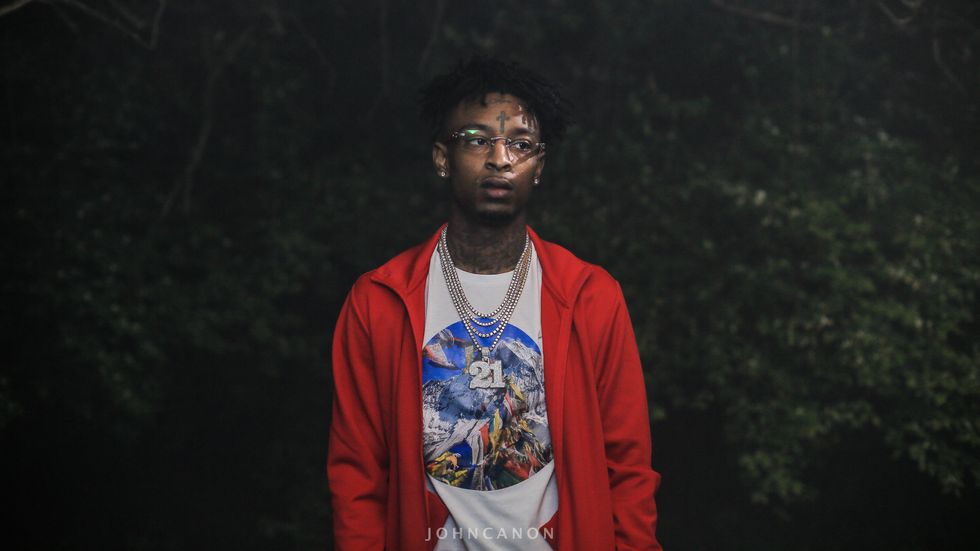Beneath the glistening gold chains and the so-called 8Ms in the bank account, there is something so rudimentary to 21 Savage that diverges far from the ostentatious façade he seems to cling so tightly onto. An acolyte to Gucci Mane, Savage belongs to the transformative Hip hop lineage of the new generation, creating Billboard 100 hits derived from mixtapes and SoundCloud tracks along with bards including novelty Lil Uzi Vert, Kendrick Lamar, and Lil Pump.
Though often characterized as bland and relatively uniform, Savage’s monotonous voice is rather an undervalued commodity hidden among those of his contemporaries. Aside from the levity and carnal pleasures that are often associated with the assortment of materialistic “Saint Laurent jacket”, “Rolex on fleek” and “Issa Goyard”, Savage voices the inscrutable concerns from the people of color by stressing what they are most deprived of – money.
Perhaps it is the immediacy of violence and fear derived from the original nomenclature “savage”, that drives his audience through the trap aesthetics to Savage’s metaphysical interior – a tragic tale of extremities beginning at a very young age. A character of many depths, Savage is an Atlanta native of Haitian and Dominican descent. Reared under the influences of crack-dealer father and the brutal callings of the streets, Savage does not flinch to the cruelty of omnipresent violence so essential to his upbringing.
From carrying a gun to school in seventh grade as “protection from bullies” to fostering a burgeoning career in prescription opiates during his late teens, Savage belongs to the niche of cliché hood kids the privileged Americans have become so accustomed of knowing.
In this jaundiced era where our president forgot to acknowledge the Jews in a Holocaust remembrance statement, accused to have funded ads that associate Native Americans with drug abuse and repeatedly called the Mexican communities as rapists, everyone is almost obliged to pinpoint themselves on the scatterplot of racial inequality.
Savage’s debut solo album Issa Album, aside from all the mumble rap, is an excruciating tale of the racial and financial landscape of colored communities in present-day America. There is no absence of guns, drug abuse, or racism in Issa Album, where Savage is chiefly committed reminding us the complexity belonging to the people of color.
Through the track “Nothin New”, produced by Metro Boomin and Zaytoven, Savage delves into the socioeconomic plight of colored communities. Howbeit lacking the same fervency as his celebrated singles like “Famous” and “Bank Account”, “Nothin New” is a brutally honest account of Savage’s own tangible experiences, bringing the audience into close proximity of his mystique. “Im tryna feed my family, I ain’t being political” is just among one of the most incisive lines in this track, addressing head-on the poverty issues so entrenched within the projects. Visuals for “Nothin New” opens with prominent figures - Colin Kaepernick, Barack Obama and, Lebron James. After the famous clip of Lebron James’ unapologetic scorn, calling Trump a “bum.”, the video cuts to a scene where Savage is at a funeral.
“Nothin New” follows a life of a young girl – a daughter of a prisoner and an addict. As the video unfolds, she is later caught for robbery and shot by the police. Frankly, Savage’s unraveling of America's systematic and institutional racism is quite a touch of a genius. Incorporating his signature monotonous rapping with a compelling tale inspired by his own psyche, Savage is able to bypass the superficiality typically attributed to his music and interrogate issues so inherently relevant to our society.
In a primordial sense, Savage is the poster child of the hood. He’s been there, he’s done that. Issa Album, despite all its controversies, is not simply about “getting high, getting laid, and getting money”. Just as Savage tweeted in late November, “Our music is a reflection of what’s going on in our community and all we doing is using our talent to escape that community”, Issa Album is a psalter as well as a desperate wail from ethnic enclaves all across the nation, calling for attention.
pic.twitter.com/UsFegJsKNE
— Saint Laurent Don (@21savage) November 21, 2017
With a revised travel ban under the mischievous name of “national security” looming around the corners of the Supreme Court, the nation ought to rethink the rationales for seclusion. A year after the election, as divided and as exclusive as we were, our society is still fighting to plow the same old weeds, so deeply rooted within. And herein lies the central problem, when and how are we going to exempt the new colored generation from these racial norms?
Maybe, after all, President Trump should give Issa Album a listen.



















